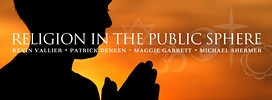I appreciate Mr. Vallier’s thoughtful reply to my comments, but they generated new concerns for me about his approach to same-sex marriage and the contraception mandate. Therefore I would like to return to those issues one more time.
On the issue of gay marriage, Mr. Vallier argues that granting extensive religious exemptions to allow churches, religious organizations, and even for-profit “closely held” businesses to deny legally married same-sex couples benefits and services would not demean or harm those couples. He argues that these couples “are not being rejected on the grounds that they are inferior or unequal, but rather because someone has a deeply held, conscientious objection to their union.” That the objection is made in the name of religion, however, does not nullify the message sent nor the harms caused by the denial of benefits or services.
Indeed, a person with a conscientious objection to same-sex marriage by definition believes that same-sex marriage is inferior to the opposite-sex marriages that the person does acknowledge and celebrate. Why else would they refuse to recognize them? Furthermore, requiring for-profits to recognize all opposite-sex couples but allowing them to deny recognition to same-sex marriages certainly renders same-sex marriages unequal. Under this arrangement, they would not be receiving the same protections and given the same value as opposite-sex marriage. And, beyond the dignity harm these couples suffer, they also lose the value of the benefits all other couples are provided. That certainly qualifies as harm.
Furthermore, the extension of this argument is clearly troubling. Under Mr. Vallier’s logic, these entities—including for-profit businesses—could use religion to deny services and benefits to virtually any couple. A health foods store whose owner objects to divorce could refuse to grant benefits to an employee’s family because she has divorced and remarried. A coffee shop could refuse to serve an interracial couple because the owners, following the logic of the trial court judge who upheld the Virginia state ban on interracial marriage in Loving v. Virginia, believe that “Almighty God … did not intend the races to mix.” A hardware store could deny family insurance coverage to an employee in an interfaith marriage. These outcomes are unjustifiable.
On the issue of the contraception mandate, I feel obligated to return to the matter of the accommodation granted to nonprofit organizations who object to conscience clause exemptions. The Little Sisters of the Poor do not have to provide contraception coverage if they fill out a form and send it to the government or their insurer. The insurance provider then provides the coverage for the women. Under this scheme, the non-profit’s opt-out form relieves the Little Sisters of the Poor of any obligations. It does not “authorize others to provide contraception.” It is the law that authorizes—indeed, requires—the insurance company to provide contraception coverage. And, whether the Little Sisters fill out a form or not, the insurance company is required to provide that coverage. The form solely serves to facilitate the accommodation—neither the government nor the insurance company can effectuate the accommodation without notice that the nonprofit is utilizing it and the proper information to put the accommodation into effect. Although these organizations may refuse to pay for or arrange for certain benefits, they should not be able to preclude the government from making those benefits available via third party arrangements.
Further, it is hard to imagine that there are really “a thousand ways to fully exempt the Little Sisters” when even filling out a form is argued to be outrageous. The only options presented, such as requiring the government to fully fund the coverage, limiting patent law on contraception, or moving toward a market-based or single-payer system of insurance, are not actually exemptions to the current law. These options require the government to adopt entirely new government schemes. All of which are, of course, political non-starters.
Again, I don’t oppose religious exemptions, but there are factors to consider other than just whether a person perceives that his or her religion is burdened. One must also look at the societal consequences of granting that exemption—how it would affect others and the common good. Although in the past, some have used religion to combat gender and race discrimination, others have used it as a justification for gender and race discrimination. I, for one, am glad that when the government enacted civil rights laws, it didn’t grant extensive religious exemptions to businesses that argued they were compelled to discriminate on the basis of race and gender in the name of religion. I hope it does the same for discrimination against LGBT Americans and same-sex couples.

